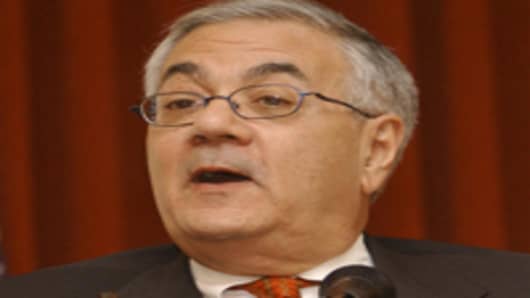The Obama administration’s regulatory reform package is back on the front burner in Congress and will soon be coming to a boil.
Powerful House Financial Services Committee Chairman Barney Frank (D-Mass.) has scheduled a series of committee voting sessions for key parts of the reform package, according to Congressional sources.
The new schedule indicates that momentum for the financial reform effort has been regained, at least on the House side, and increases the chance that Democrats can meet their goal—as outlined in in early September -- of having a “comprehensive plan” in place by the end of October or November.
The tentative schedule, a copy of which was obtained by CNBC.com, was sent to members early this week. It calls for markups of bills covering expanded oversight over OTC derivatives, the creation of a consumer financial protection agency and capital markets regulator reform.
(Related: Fed Chief Bernanke and Treasury Secretary Geithner plan "full court press" on Congress this week. See video)
The markup will follow a series of public hearings on the remaining pieces of the sweeping overhaul plan, which includes the creation of a system regulator, new federal authority over too-big-to-fail firms—such as AIG ,which had led to embarrassing and costly federal bailouts in the crisis of 2008—and limits on executive compensation.
Senate Banking Committee Chairman Chris Dodd (D-Conn.) recently said he wants to write his version of the bill in October towards a markup in November, but further details about the timing have not been made public.
Slideshow: The Biggest Bank Failures of 2009
Thus far, Frank’s committee has only advanced pay legislation, which the full House approved by a 237-185 margin in late July right before the summer recess.
Until the latest round of hearings that began in both the House and Senate in mid September, there was growing speculation that legislative momentum has been lost for the financial system reforms and that it might not happen this year. House Democrats and President Obama had repeatedly stated they want the package to become law this year.
The slowdown appeared to be partly a result of the preoccupation and overwhelming complexity of heath care reform legislation, which is considered the administration’s top priority this year.
The push for regulatory reform comes as lawmakers and the nation approach the one-year anniversary of emergency legislation authorizing a $700 billion financial aid package for the financial sector.
“He (Frank) wants the political will there,” said one Congressional source familiar with the committee and the legislative agenda. “Our memory isn't that long, especially when it comes to passing extreme regulatory reform.”
Based on the current schedule the House committee will mark up bills on derivatives and the consumer protection agency from Wednesday Oct. 14 to Friday Oct. 16. The fact that the work will take place on Friday, which is usually a travel day for members, is notable.
Frank’s committee will spend two days (Oct. 21-22) on the markup of capital markets regulatory reform, following a one day hearing on the systemic risk regulator and prudential regulation of banks.
Both measures have been the subject of controversy lately. The administration’s proposal to give more authority to the Federal Reserve drew protests from both sides of the political aisles. Some concerns were recently allayed by the latest Congressional testimony of Fed Chairman Ben Bernanke, which in downplaying the central bank’s role appeared to appease Congressional critics.
Banking regulation, however, has the potential to be a hot-button issue, because Frank and Dodd have very different preferences on the regulation of institutions in the future structure.
Dodd in September outlined a format where the current regulatory powers of four federal agencies—including the Fed and FDIC—would be folded into one new entity.
Frank is pushing something similar to the administration plan that would merge the functions of the agencies overseeing the banking and savings and loan industries.
Frank and Dodd at times have also appeared at odds over both the strategy and timing of the financial reform legislation, but they now appear to at least share the same deadline.
Unlike the House, the measures will not be handled on a piece-meal basis in the Senate, where there is always the threat of a filibuster..
"We're going with one comprehensive package because we thing everything is so closely tied together," said a spokeswoman for Dodd.



